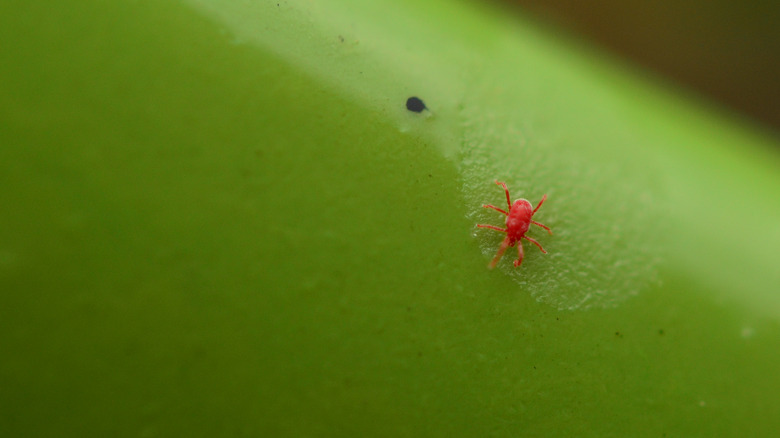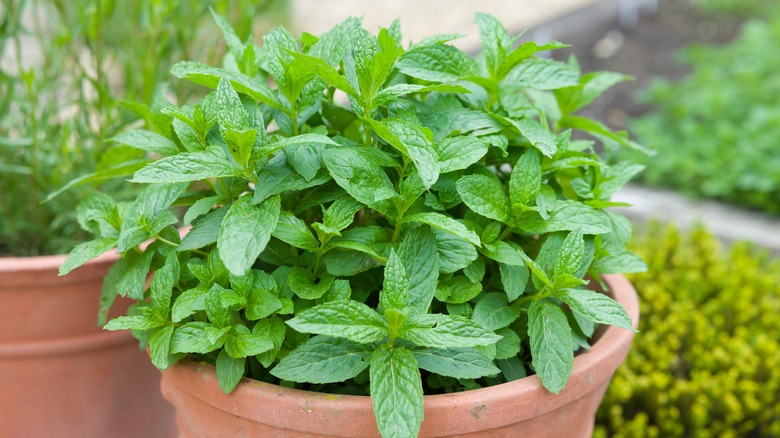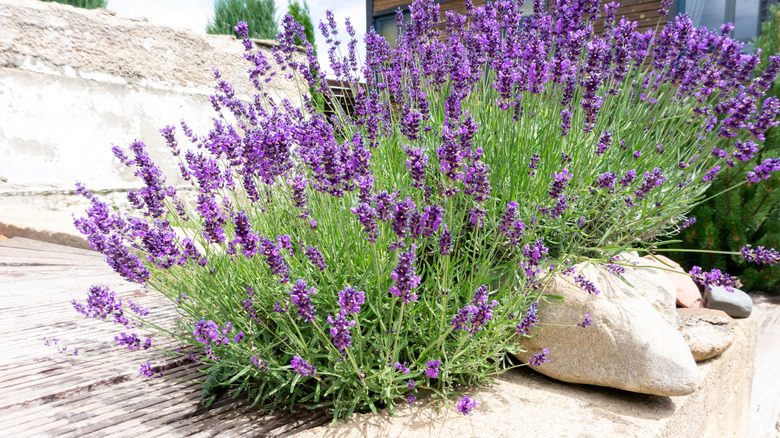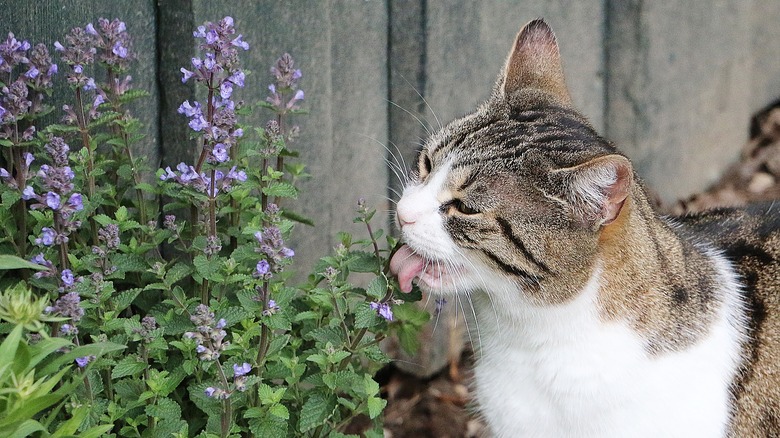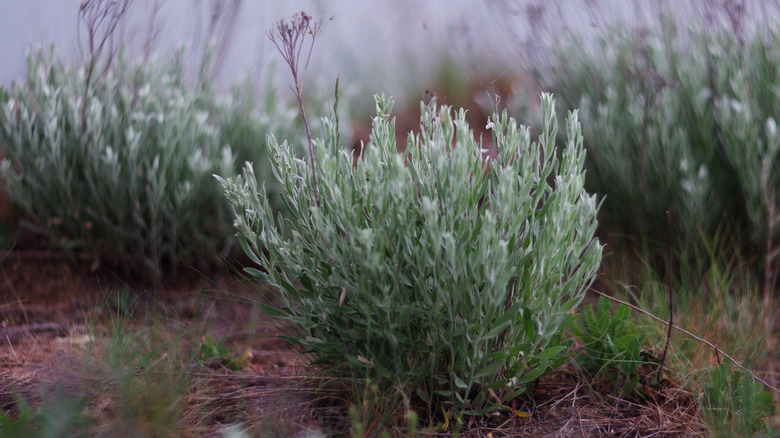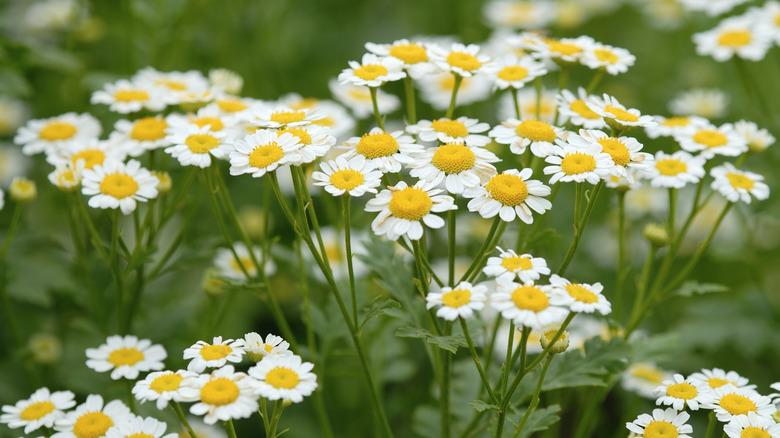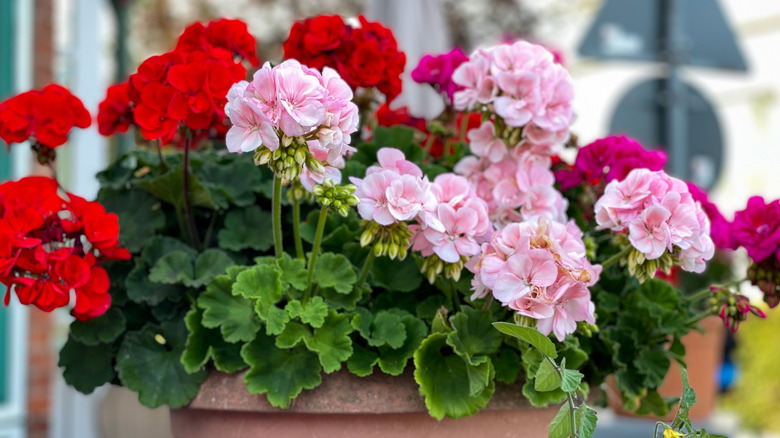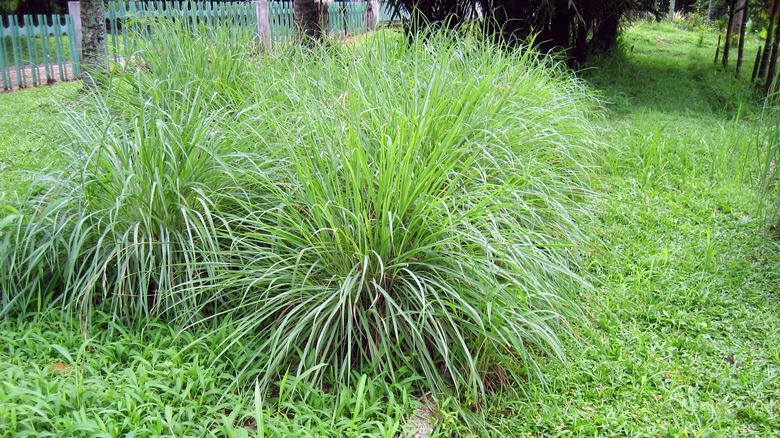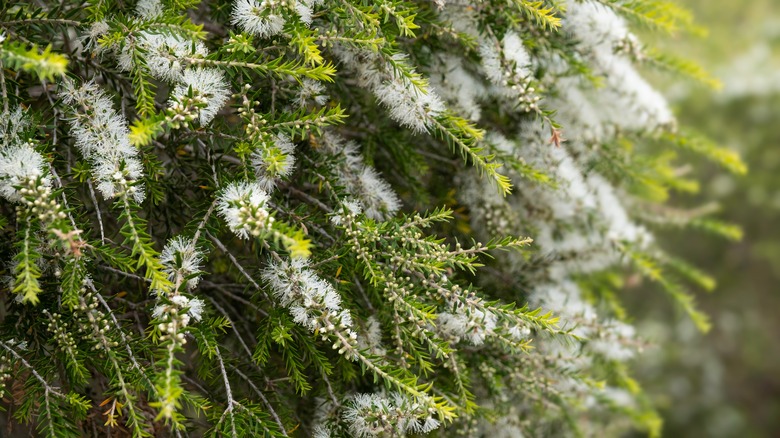The 8 Best Chigger-Repelling Plants To Add To Your Yard
Chiggers are tiny red mites in the arachnid family, closely related to spiders and ticks. You may also hear chiggers referred to as berry bugs, bush-mites, or red bugs. Chiggers tend to be at their worst during the summer, when they hang out in tall grass and bushes, just waiting for an unsuspecting host to brush by. They are only parasitic to humans and animals during their larval stage, when they'll suck fluids from their host's skin and potentially feed there for days. You may not even realize you have a chigger problem until it's too late, as their bites take time to develop. They're usually found in tight, warm spots like your waistband or sock cuffs and can be quite itchy. Luckily, like many other arachnids and pesky insects, chiggers find strong-smelling plants to be off-putting.
Because we tend to bathe often, these arachnids rarely stay on humans for more than a few hours. Still, the idea of tiny bugs chewing on your flesh is enough to make anyone's skin crawl. Getting rid of chiggers in your yard could be as simple as growing a few chigger-repelling plants. Here are eight simple plants that will make those pesky parasites turn up their noses — and save you from becoming a buggy buffet.
1. Mint
Mint (Mentha) has a strong aroma that is very effective at repelling arachnids, including chiggers. However, be forewarned that mint is very fast-spreading and potentially-invasive. For this reason, it's best to grow your mint plants in containers, which can be placed near outdoor sitting areas or at the borders of your yard, where chiggers tend to congregate. This plant grows best in USDA hardiness zones 3 through 8. You can also try using drops of diluted peppermint essential oil or rubbing the fresh mint leaves on your skin for a natural, wearable pest repellent.
2. Lavender
Typically grown in hardiness zones 5 to 9, lavender (Lavandula) is famous for its natural scent that is pleasing to humans, but it's not so attractive to chiggers. Even though lavender grows in tall, grassy formations, chiggers tend to steer clear of the plant's strong scent. Plus, different varieties of lavender can be used to keep blooms growing from spring all the way through to late summer, ensuring strong defense when chiggers are at their worst. Lavender essential oil may also help to soothe chigger bites.
3. Catnip
Catnip (Nepeta cataria), also known as catmint, is another garden-friendly member of the mint family, which, as we know, is excellent at repelling chiggers and other arachnids. In fact, 2021 research published in Current Biology declared that catnip is an effective insect repellent that could replace commercial DEET! This is mostly thanks to a natural compound called nepetalactone, which irritates insects and makes them incapable of detecting humans' scent – and also just happens to produce a euphoric effect in cats. This plant can be grown in USDA zones 3 through 9.
4. Sagebrush
Sagebrush (Artemisia tridentata) is not the same thing as common sage (Salvia officinalis), although the two are often confused. Sagebrush, which can be grown in USDA zones 4 to 9, has a fresh, spicy aroma that is off-putting to chiggers, but it also contains a powerful oil known as thujone. This ingredient is effective at repelling a variety of insects, including chiggers and mosquitoes. Plus, sagebrush is a very hardy plant that thrives in hot, dry conditions, making it an ideal repellent for those in desert climates.
5. Chamomile
Also grown in zones 4 through 9, chamomile (Matricaria) can repel spiders and ticks, so it stands to reason that it's most likely effective against other arachnids like chiggers. Chamomile oils have been shown to destroy the eggs of certain mites, so they may cut the chigger life cycle short before they can hatch and climb aboard your clothes. These charming little flowers are easy to grow in containers, raised beds, or directly in the soil, so long as they receive plenty of sunlight. Like lavender, chamomile may also be useful for relieving the itch of existing chigger bites.
6. Geraniums
Geraniums (Pelargonium X hortorum) have a rose-like scent that smells pleasant to most humans but is strong enough to deter chiggers and other biting pests from your garden. When planting geraniums in your yard, place them directly in the garden soil or in containers in USDA hardiness zones 3 through 9, where they'll actually bloom more if they're slightly root-bound. The geranium leaves can also be dried and crushed into a powder blend, which you can apply to your body or sprinkle outdoors to repel chiggers naturally.
7. Lemongrass
Lemongrass (Cymbopogon) is another fragrant plant that is highly-effective at repelling pesky arachnids and insects. Because it's often used in natural topical chigger repellents, learning to grow and harvest lemongrass can help you naturally get rid of chiggers. Lemongrass plants will thrive in hot and sunny areas with well-draining soil and is only winter hardy in USDA zones 10 and 11. Plus, its bushy appearance makes it an excellent filler plant for garden beds and grassy border areas where chiggers tend to hide.
8. Tea tree plants
Tea tree (Melaleuca alternifolia) is one of the strongest and most distinctive essential oils available. One 2009 study published in the National Library of Medicine found that 40% tea tree oil was 100% effective at repelling chiggers. Tea tree plants, also known as paperbark trees, are native to Australia and can be grown in USDA zones 9 to 11. However, tea tree has a strong camphoraceous scent, so you may want to plant it away from your outdoor lounge areas to avoid being overwhelmed by its fragrance.
